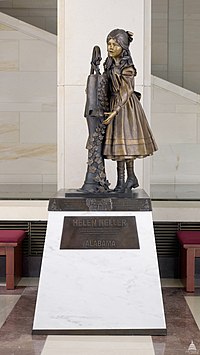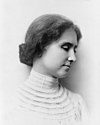| Helen Keller | |
|---|---|
 The statue in 2011 The statue in 2011 | |
| Artist | Edward Hlavka |
| Medium | Bronze sculpture |
| Subject | Helen Keller |
| Location | Washington, D.C., United States |
Helen Keller is a bronze sculpture depicting the American author and political activist of the same name by Edward Hlavka, installed in the United States Capitol Visitor Center's Emancipation Hall, in Washington, D.C., as part of the National Statuary Hall Collection. The statue was gifted by the U.S. state of Alabama in 2009, and replaced one depicting Jabez Lamar Monroe Curry, which had been donated in 1908.
Description and history
On October 7, 2009, a bronze statue of Keller was added to the National Statuary Hall Collection, as a replacement for the State of Alabama's former 1908 statue of the education reformer Jabez Lamar Monroe Curry. It is displayed in the United States Capitol Visitor Center and depicts Keller as a seven-year-old child standing at a water pump. The statue represents the seminal moment in Keller's life when she understood her first word: W-A-T-E-R, as signed into her hand by teacher Anne Sullivan. The pedestal base bears a quotation in raised Latin and braille letters: "The best and most beautiful things in the world cannot be seen or even touched, they must be felt with the heart." The statue is the first one of a person with a disability and of a child to be permanently displayed at the U.S. Capitol.
See also
References
- ^ "Helen Keller". Architect of the Capitol. Retrieved December 30, 2017.
- "Helen Keller Statue Unveiled in Capitol". CBS News. October 7, 2009. Retrieved December 25, 2008.
- "Helen Keller statue unveiled at Capitol". CNN. October 7, 2009. Retrieved December 25, 2008.
- "One Impressive Kid Gets Her Statue at Capitol". The Washington Post. October 8, 2009. Retrieved December 25, 2008.
External links
 Media related to Helen Keller in the National Statuary Hall Collection at Wikimedia Commons
Media related to Helen Keller in the National Statuary Hall Collection at Wikimedia Commons
| Helen Keller | ||
|---|---|---|
| Life history |  | |
| Schools attended | ||
| Related foundations | ||
| Related works | ||
| Related | ||
This article about a sculpture in the United States is a stub. You can help Misplaced Pages by expanding it. |